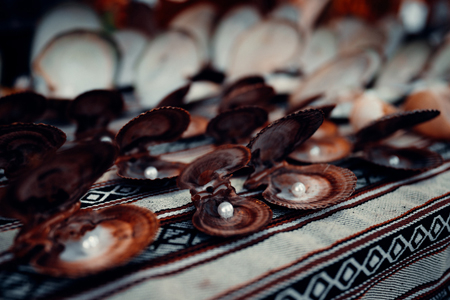Jesus said to the crowds, ‘The kingdom of heaven is like treasure hidden in a field which someone has found; he hides it again, goes off happy, sells everything he owns and buys the field.
Again, the kingdom of heaven is like a merchant looking for fine pearls; when he finds one of great value he goes and sells everything he owns and buys it.
Again the kingdom of heaven is like a dragnet cast into the sea that brings in a haul of all kinds. When it is full the fishermen haul it ashore; then, sitting down, they collect the good ones in a basket and throw away those that are no use. This is how it will be at the end of time: the angels will appear and separate the wicked from the just to throw them into the blazing furnace where there will be weeping and grinding of teeth.
Have you understood all this?’ They said, ‘yes’. And he said to them, ‘Well, then, every scribe who becomes a disciple of the kingdom of heaven is like a householder who brings out from his storeroom things both new and old.’ (Matthew 13:44-52)
Reflection - Close encounters with the Kingdom of God
In the Gospel, Jesus compares the Kingdom to treasure hidden in a field, to a merchant on the lookout for fine pearls and to a fisherman’s dragnet which brings in a very mixed catch.
The point of the parables is the behaviour of the people in them.
In the first parable someone stumbles across the treasure by chance. Sometimes that can happen to us, too. We are happily living our lives when, by chance, something happens or we meet someone and our lives change for ever. On reflection we discern the presence of God in that encounter.
In the second parable the Kingdom is found after a long search. It is a reassurance that those who seek always find, and those who knock on the door will always have it opened.
The third parable introduces a note of reality: the Kingdom is a mixture of all kinds of things and some sorting out is needed.
In the first two parables the joy and delight of those who find (experience) the Kingdom is obvious. It is so strong that nothing is spared in order to posses the Kingdom.
The purpose of parables is not to provide answers to questions but to get us to think.
As we know, the Kingdom of God is not a ‘thing’ or a ‘place’. It is an experience or an encounter with the life of God.
In the life and ministry of Jesus many people experienced the Kingdom through their encounter with him which brought dignity, love, forgiveness, release from illness, disability, guilt, shame and even death. Jesus made present the reign of God’s grace for people in all kinds of need.
While we are sometimes overwhelmed by the experience of the presence of God within our hearts, more often we experience the reign of God’s grace through others. These people, like Jesus, somehow make present, make real the presence and action of God especially (but not only) in our moments of need.
Having experienced that, we too, want to possess, to find and hold onto, the Source which touched us so deeply and brought us hope, comfort and freedom.
The kingdom, as we are reminded in the third parable, is a mixed bag of good and rotten fish, saints and sinners. It is not the task of members of the kingdom to judge; the final sorting out belongs to God alone. In the meantime, patience and tolerance must guide the practice of those in the kingdom.
The people of the kingdom seek the things that are of real value in life. They are prepared to make great sacrifices in order to make them their own. They live their lives with virtue and wisdom and their lives are a blessing for others as they draw from their rich store of values and virtues, of wisdom and grace. They never stop seeking the things of real value, the riches of the kingdom and they never stop making God present for those around them.
You can download and print our prayers and reflections for this Sunday.
pdf
Celebrating At Home 17th Sunday in Ordinary Time [PDF]
undefined
Celebrating At Home 17th Sunday in Ordinary Time [ePub]















